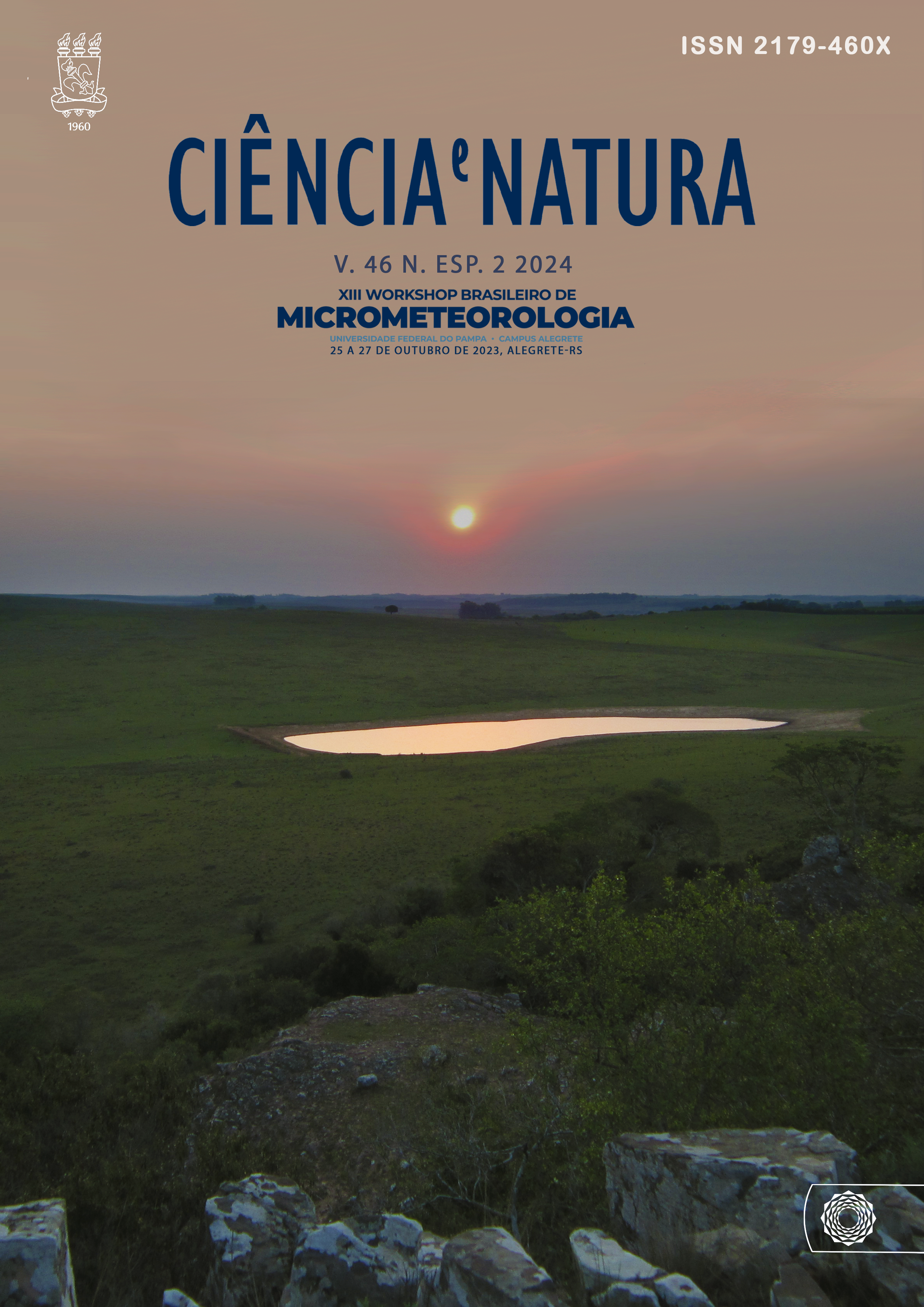Destreza dos modelos WRF e GFS em contraste com perfis verticais de radiossonda
DOI:
https://doi.org/10.5902/2179460X87743Palavras-chave:
Radiossonda, WRF, ModeloResumo
O estudo focou em avaliar a destreza dos modelos de previsão numérica usando dados de radiossondas, que consistem em coletar informações do perfil atmosférico, nas quais são fundamentais para a inicialização dos modelos. Para esta análise foram comparados dois modelos, GFS e WRF, com as observações das radiossondas. As observações utilizadas são das radiossondas lançadas do Aeroporto internacional de Santarém/PA - Maestro Wilson Fonseca. De um modo geral, ambos os modelos subestimaram as medições da temperatura do ar em níveis baixos, mas alinhou-se melhor em altitudes elevadas. Quanto ao vento zonal, o GFS superestimou em alguns níveis, enquanto o WRF teve discrepâncias menores. Os modelos enfrentam desafios em prever a temperatura do ar, sugerindo limitações na física e nas condições de contorno específicas da região. Ambos os modelos tiveram desempenho semelhante na previsão do vento zonal. O estudo destaca a importância de considerar tais discrepâncias na previsão meteorológica e como essas ferramentas podem ser ajustadas para melhorar suas previsões.
Downloads
Referências
AHRENS, C. D. Meteorology Today: An Introduction to Weather, Climate and the Environment. 13 ed. Boston: Cengage Learning, 2021.
NASH, J. Measurement of upper-air pressure, temperature and humidity. World Meteorological Organization, 2015. IOM Report-No 121. Disponível em: <https://library.wmo.int/index.php?lvl= notice_display&id=18528>. Acesso em: 14 ago 2023.
PARRA, R. Assessment of Land Surface Schemes from the WRF-Chem for Atmospheric Modeling in the Andean Region of Ecuador. Atmosphere, v. 14, n. 3, p. 1-24, mar 2023. DOI: https://doi.org/10.3390/atmos14030508
PRASAD, V. S.; JOHNY, C. J.; MALO, P.; SINGH, S. K.; RAJAGOPAL, E. N. Global retrospective analysis using NGFS for the period 2000-2011. Current Science, v. 112, n. 2, p. 370-377, jan. 2017. DOI: https://doi.org/10.18520/cs/v112/i02/370-377
RAJAGOPAL, E. N.; GUPTA, M. D.; MOHANDAS, S.; PRASAD, V. S.; GEORGE, J. P.; IYENGAR, G. R.; KUMAR, D. P. Implementation of T254L64 Global Forecast System at NCMRWF. NCMRWF Technical Report, pp. 1-42, 2007. Disponível em: <https://www.ncmrwf.gov.in/gfs_report_final-t264.pdf>. Acesso em: 13 ago 2023.
SKAMAROCK, W. C.; KLEMP, J. B.; DUDHIA, J.; GILL, D. O.; BARKER, D.; DUDA, M. G.; HUANG, X. Y.; WANG, W.; POWERS, J. G. A Description of the Advanced Research WRF Version 3. 2008. (No. NCAR/TN-475+STR). University Corporation for Atmospheric Research. http://dx.doi.org/10.5065/D68S4MVH
STENSRUD, D. J. Parameterization Schemes: Keys to Understanding Numerical Weather Prediction Models. Cambridge: Cambridge University Press, 2007. https://doi.org/10.1017/CBO9780511812590. DOI: https://doi.org/10.1017/CBO9780511812590
WARNER, T. T. Numerical weather and climate prediction. Cambridge: Cambridge University Press, 2010. https://doi.org/10.1017/CBO9780511763243. DOI: https://doi.org/10.1017/CBO9780511763243
Downloads
Publicado
Como Citar
Edição
Seção
Licença
Copyright (c) 2024 Ciência e Natura

Este trabalho está licenciado sob uma licença Creative Commons Attribution-NonCommercial-ShareAlike 4.0 International License.
Para acessar a DECLARAÇÃO DE ORIGINALIDADE E EXCLUSIVIDADE E CESSÃO DE DIREITOS AUTORAIS clique aqui.
Diretrizes Éticas para Publicação de Revistas
A revista Ciência e Natura está empenhada em garantir a ética na publicação e na qualidade dos artigos.
A conformidade com padrões de comportamento ético é, portanto, esperada de todas as partes envolvidas: Autores, Editores e Revisores.
Em particular,
Autores: Os Autores devem apresentar uma discussão objetiva sobre a importância do trabalho de pesquisa, bem como detalhes e referências suficientes para permitir que outros reproduzam as experiências. Declarações fraudulentas ou intencionalmente incorretas constituem comportamento antiético e são inaceitáveis. Artigos de Revisão também devem ser objetivos, abrangentes e relatos precisos do estado da arte. Os Autores devem assegurar que seu trabalho é uma obra totalmente original, e se o trabalho e / ou palavras de outros têm sido utilizadas, isso tem sido devidamente reconhecido. O plágio em todas as suas formas constitui um comportamento publicitário não ético e é inaceitável. Submeter o mesmo manuscrito a mais de um jornal simultaneamente constitui um comportamento publicitário não ético e é inaceitável. Os Autores não devem submeter artigos que descrevam essencialmente a mesma pesquisa a mais de uma revista. O Autor correspondente deve garantir que haja um consenso total de todos os Co-autores na aprovação da versão final do artigo e sua submissão para publicação.
Editores: Os Editores devem avaliar manuscritos exclusivamente com base no seu mérito acadêmico. Um Editor não deve usar informações não publicadas na própria pesquisa do Editor sem o consentimento expresso por escrito do Autor. Os Editores devem tomar medidas de resposta razoável quando tiverem sido apresentadas queixas éticas relativas a um manuscrito submetido ou publicado.
Revisores: Todos os manuscritos recebidos para revisão devem ser tratados como documentos confidenciais. As informações ou ideias privilegiadas obtidas através da análise por pares devem ser mantidas confidenciais e não utilizadas para vantagens pessoais. As revisões devem ser conduzidas objetivamente e as observações devem ser formuladas claramente com argumentos de apoio, de modo que os Autores possam usá-los para melhorar o artigo. Qualquer Revisor selecionado que se sinta desqualificado para rever a pesquisa relatada em um manuscrito ou sabe que sua rápida revisão será impossível deve notificar o Editor e desculpar-se do processo de revisão. Os Revisores não devem considerar manuscritos nos quais tenham conflitos de interesse resultantes de relacionamentos ou conexões competitivas, colaborativas ou outras conexões com qualquer dos autores, empresas ou instituições conectadas aos documentos.






